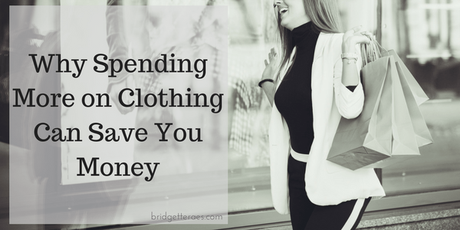
I want to preface this blog post by saying that I am incredibly economical and in no way wealthy. Like most Americans, I have to budget and can't spend all willy nilly at the drop of a hat. I'm obsessed with Poshmark to get deals on clothing and accessories, follow sales and text my mom when I get a great price on something new. So let me be clear, there is a big difference between being cheap and being frugal. My mom, the original Bargain Hunter, has always said that she doesn't buy cheap clothes, she gets nice clothes at a good price. There is a big difference.
Here's an old video of me and my mom (you may have seen it before) discussing this along with how she gets her best bargains.
I say all this because I don't want the title of this post to imply that I think anyone should spend more than they have or not get a great sale. However, buying cheap clothes that you feel ambivalent about can wind up costing more and that spending more or buying better quality can be more economical. Here's why.
Why Spending More on Clothing May Save You Money
You're more thoughtful with more expensive purchases
Anytime anyone is planning on spending more on something they tend to take their time and think through the purchase. They make sure they will get value on the investment, will wear it and enjoy it. There's a chance they have thought it about the purchase for weeks, months, even years before pulling the trigger.
Compare it to times when someone has picked something up because it was on sale and the money they parted with didn't have any impact on their finances. It's easy to not value these purchases or be thoughtful about them. Being lured in by a sale without any thought can cost more money because there is typically less appreciation about them. On the surface, cheap clothing seems like the smart route to take because you are getting such a good deal. However, if you never wear these cheap items or the pieces fell apart after just a few wears, they wind up costing you more in the end.
You will take better care of your more expensive purchases
When we value something we take care of it. Often, the amount we have spent on something dictates how we care for it. Who cares if you toss that cheap shirt in the dryer, it only cost $9.99. But the t-shirt that cost $79.99, well, you will make sure it never sees the inside of a dryer, gets folded neatly and never gets a stain. As a result, your more expensive purchases wear better, last longer because they are valued and better cared for.
You value more expensive purchases when you earn them
People who have nice things don't typically get them all at once. Some even have lists of items they would like to buy over time. There is such a feeling of victory when someone has worked hard to earn the money to buy something they have always wanted, and nobody walks away with these items being flip about them.
When we invest in things, we're also typically cognizant of purchasing things we know we'll get the most use from and will wear. Over time, these purchases quite often pay for themselves. A cheap top that costs $14.99 that gets worn once costs more per wear than a $300 pair of pants that get worn 100 times.
You appreciate the sale
With brick and mortar retail being soft and online sales being impossible not to find, it's rare that anyone has to pay full price for anything any longer. As I said earlier, the cardinal rule I was raised on about sales was to get nice things at a good price. That said, you don't necessarily need to pay full retail to value the purchase. In fact, there is a great chance you will appreciate it even more when you know you loved it and got it for a steal.
The key here is to never just buy cheap clothing for the sake of the price or to be mindless about shopping. Sales are wonderful and should be taken advantage of just as long as the the things you buy bring you more value than what you paid for it through wear and appreciation of it.
Quality over quantity
Buying the best can have a profound effect on how we treat the clothes and accessories that we buy. It's not necessarily how much money is spent as much as it is the value we feel towards these things. Instead of dropping small amounts on things that you feel ambivalent about, save money instead by purchasing things that have great value to you.

